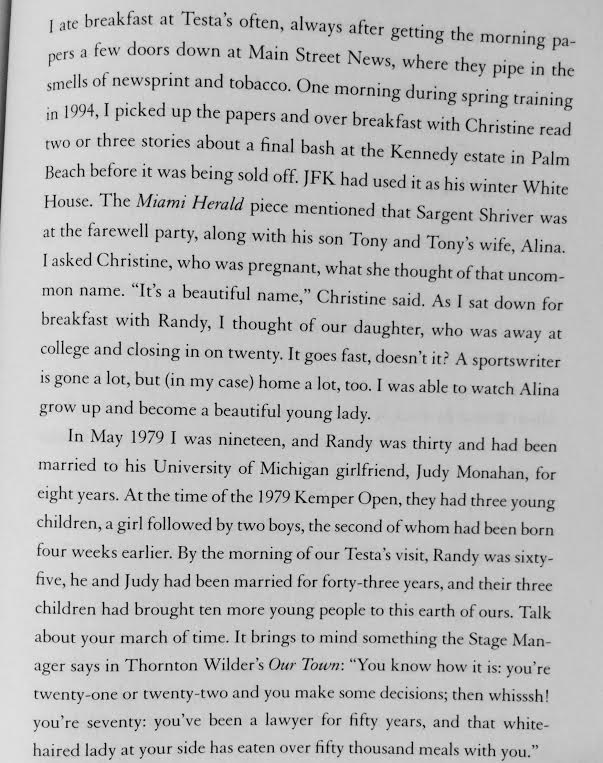I recently finished reading Michael Bamberger’s Men In Green. It was awesome and I loved it. This part, near the end, really smacked me, though. The author was visiting someone he used to caddie for when he was a kid, much younger than I am now.
Stuff I learned
There are 62 posts filed in Stuff I learned (this is page 1 of 7).
Moses — the original LeBron
I couldn’t stop laughing when I was reading this this morning:
And the Lord said to Moses and Aaron, “Take handfuls of soot from the kiln, and let Moses throw them in the air in the sight of Pharaoh.
It shall become fine dust over all the land of Egypt, and become boils breaking out in sores on man and beast throughout all the land of Egypt.”
So they took soot from the kiln and stood before Pharaoh. And Moses threw it in the air, and it became boils breaking out in sores on man and beast. (Exodus 9:8-10).

On daughters and love
I’m reading Matt Chandler’s To Live Is Christ to Die Is Gain right now and this on his daughter crushed me.
He was talking about wanting to convey to his daughter why he loved her and that his love for her wasn’t contingent upon anything she had done or would do.
I will never forget taking her little face in my hands and watching her look up at me with those adorable eyes that melt me. And I told her, “I love you because you are mine. God gave you to me.”
On becoming a better editor
I’m working on becoming not only a better writer in 2015 but a better editor and, in some cases, self-editor.
It’s a difficult thing because by definition you always think what you wrote is really good — that’s why you wrote it.
This from Jon Acuff was encouraging.
When you write a book, open a business or launch a product don’t be afraid to say goodbye to parts of what you are creating that don’t serve the larger mission, the momentum or the audience.
Strip them all away until the only thing that remains is the best of the best of the best. (Acuff)
Something to strive for this year — not only in writing but in the possessions I have and what I eat as well.
Wonderful advice for new (or old) bloggers
I recently saw this post from John Saddington on how he would restart a blog if he was doing it in 2015. I was pretty stoked to read it and I wasn’t let down.
My two biggest takeaways were don’t waste your time with the ancillary stuff — just the meat, people. Just the meat. Here’s how he put it.
Consequently, you will have a natural desire to customize the look and the feel of your new blog and website because you want it to represent you. I want you to fight this impulse to the death, especially in the beginning.
Instead, this is what you do: Sign up for a new blog. Start writing.
Yes. Amen. All of the exclamations.
The late-night infomercial theory
The two most insightful bits for me from this post on social media takeaways from 2014:
1. Post during times when nobody else is posting (the late-night infomercial theory).
2. When it comes to length of social media, shorter is always better.
I’ve actually noticed No. 1 in my work. When I post something randomly at, say, 1 AM it gets way more engagement than I would have thought it would at that time.
The scary part of No. 2 is how much difference there is in engagement when you shorten something by 40-70 characters. Not words. Characters.
A staggering reality
How long does it take to read the Bible?
Only about seven minutes a day if you read 300 words a minute and do it every day for a year, apparently.
Though that doesn’t include time spent studying, thinking and writing. Nor does it account for my ability to wander all over my brain with a Bible in front of me.
But still.
How Shantanu Starick went 23 months without spending a dime
I’m a huge fan of the bartering method — even if it is probably a tad idealistic — so I loved this video about how a world photographer went nearly two years without making or spending a dime.
The “aha!” moment for me was when he said the following:
“The work environment changed (when he stopped dealing in money). It was no longer a contract and a client. It wasn’t even close.
It wasn’t two parties thinking about time and money because they didn’t apply anymore. The barriers came down and what you’re left with is an interaction with people.”
It’s a powerful thing to think about stripping away time and money from the way you trade your professional craft.
As Starick put it, they just have to make a little bit more of what they already make to provide for you. And you just have to bring your work.
How to practice everything better
I originally read this in a post about how to get better at golf (a thing I’m constantly trying to do) but the more I thought about it the more I wondered if it didn’t apply to pretty much everything.
From Dr. Christine Carter on Bulletproof Musicians:


